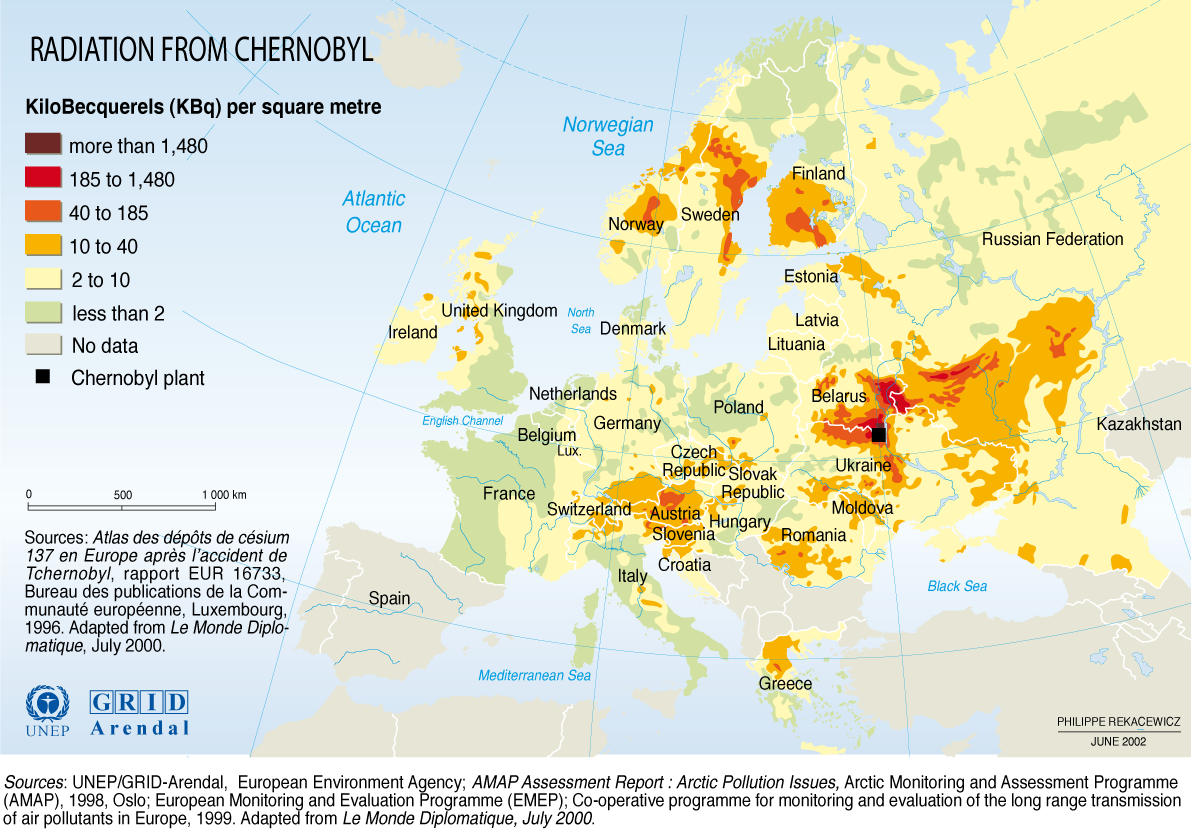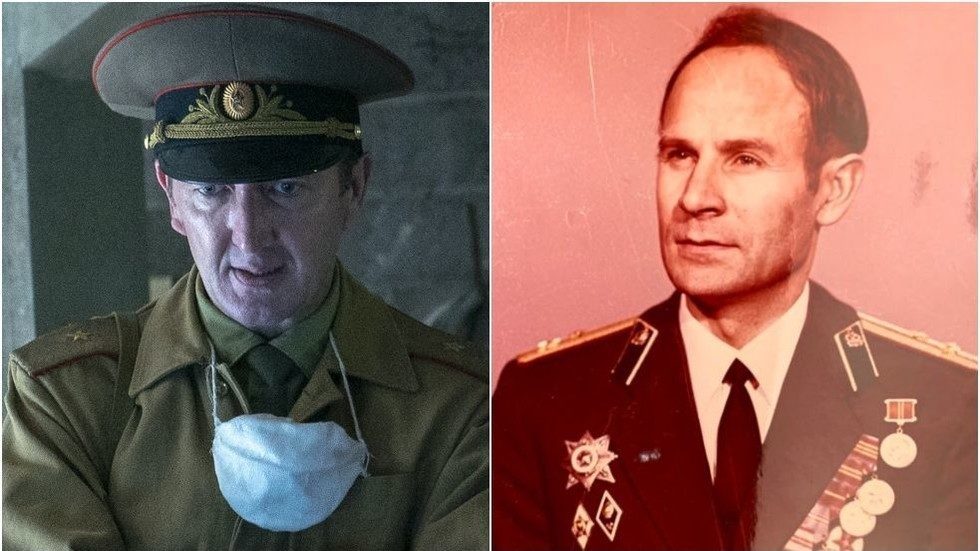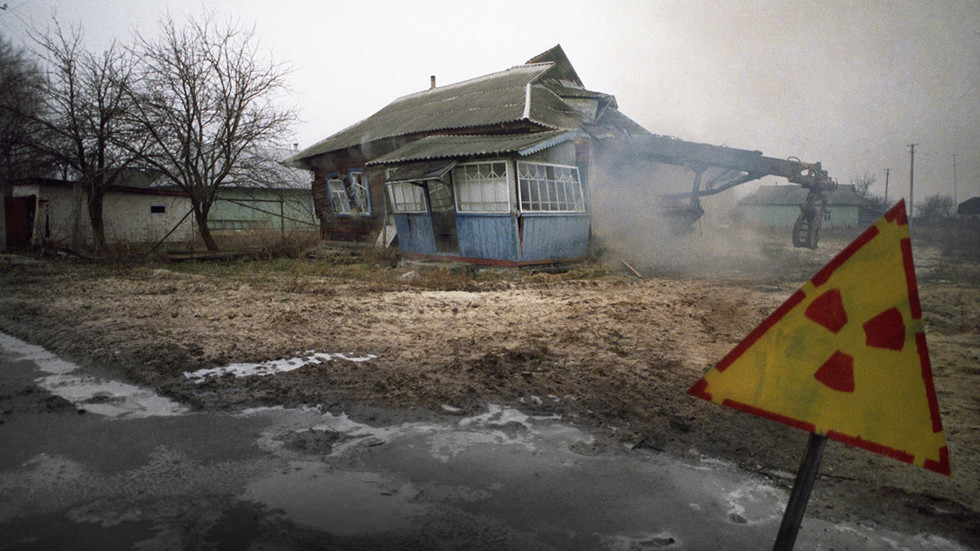Cheating Chernobyl
This interview was first published in New Scientist print edition
Source :
New Scientist web site
Alexander Yuvchenko was on duty at Chernobyl's reactor number 4 the night it exploded on 26 April 1986. He is one of the few working there that night to have survived. He suffered serious burns and went through many operations to save his life, and he is still ill from the radiation. He recently broke his silence for a documentary to be shown on the Discovery Channel. Here he speaks to Michael Bond about what happened that night.
Q: How did you end up working at Chernobyl?
A: I chose it. It was one of the best stations in the Soviet Union, it was a good town to live in, and I had been there for practical work as part of my studies. And it was a good wage. Being a nuclear engineer was a prestigious career - in those days. Nowadays people in Russia prefer to be businessmen and lawyers.
Q: What were you doing the night the reactor exploded?
A: I was on the night shift. When I turned up I found out that the safety test that had been planned for the day had been put off until the evening. The reactor had already been powered down and so we would just be overseeing its cooling, which is a very easy job. I was thinking that I wouldn't have much to do that night.
Q: What were you doing when you heard the explosion?
A: I was in my office, talking to a colleague who had come in to ask for some paint, and reading some documents.
Q: What happened?
A: The first thing I heard wasn't an explosion, it was a thud, a shaking. Then two or three seconds later came the explosion. The doors of my office were blown out. It was like when an old building is demolished, with clouds of dust, but combined with lots of steam. It was a very damp, dusty, powerful movement of air. There was a lot of shaking, a lot of things were falling. The lights went off. Our first thought was to find somewhere we could safely hide. We headed towards the transport corridor, where there was a small passage with a low ceiling. We were standing there and everything was falling around us.
Q: What did you think it was?
A: When I heard the thud I thought it was something very heavy that had fallen. After that I didn't know. I thought that maybe war had begun.
Q: Did you imagine that it might be the reactor?
A: I couldn't imagine it was something to do with the reactor. Before it happened there were no vibrations, no sounds, nothing to indicate there was something wrong. We were trained for various emergency situations. We were engineers, and we were trained in what the reactors could or could not do and what could go wrong. We were prepared for fire and other things, but we were not trained for this. We all thought the safety measures were reliable, that if you pressed the emergency stop button to lower the control rods into the reactor - which is what my friend Leonid Toptunov in the control room did that night - that it would stop the power as it was supposed to. But it didn't. People make mistakes, but we thought the safety measures would compensate for that. We believed what we were told in the work manual.
Q: What did you do after the explosion?
A: I went back to my office and tried to ring the control room for reactor number 4 to find out what had happened, but there was no line. Suddenly the phone from control room number 3 rang. I got a command to bring stretchers. I grabbed the stretchers and ran. Outside the control room I met a friend who had been close to the centre of the explosion. I didn't recognise him. His clothes were black and his face was disfigured because he had been covered in scalding water. I only recognised him by his voice. He told me to go to the site of the explosion because there were others injured. This friend was being tended by others, so I got a torch and ran to find the other operator who had been near the huge coolant tanks.
Q: What did you find?
A: I got to where I expected to find this person but I couldn't find anything, there was a huge mess. I found him on the other side, he had managed to crawl away. It was the same picture: he was wet, dirty, with serious scalding burns. He was standing up but was in an extremely shocked state, shaking. He told me I had to go to where the main blast happened, which was where my friend Valera Khodemchuk was. This guy couldn't see it, but there was nothing there in that direction, it was just empty space.
Q: What happened then?
A: At this point I saw Yuri Tregub, who had been sent from control room number 4 by Anayoly Deatlov, Chernobyl's deputy chief engineer, to manually turn on the emergency high-pressure coolant water to flood the area. Realising that he wouldn't be able to do this on his own, I told my friend where to go to get help and I went with Tregub to turn on the water.
Q: Did you succeed?
A: We weren't able to get to the taps. The coolant tanks were in a hall close to the reactor. There were two doors in. We couldn't get in the first because the walls had collapsed, so we went down a couple of floors to the other door. We were in water up to our knees. We couldn't open the door but we could see a little through it, and all we could see were ruins. The huge water containers had been blown apart. There was just a wall and a door left. We were looking into open space.
Q: Literally?
A: To get a clearer idea of what had happened we walked outside. What we saw was terrifying. Everything that could be destroyed had been. The entire water coolant system was gone. The right-hand side of the reactor hall had been completely destroyed, and on the left the pipes were just hanging. That was when I realised that Khodemchuk was definitely dead. The place where I was told he'd been standing was in ruins. The huge turbines were still standing, but everything around them was rubble. He must have been buried under that. From where I stood I could see a huge beam of projected light flooding up into infinity from the reactor. It was like a laser light, caused by the ionisation of the air. It was light-bluish, and it was very beautiful. I watched it for several seconds. If I'd stood there for just a few minutes I would probably have died on the spot because of gamma rays and neutrons and everything else that was spewing out. But Tregub yanked me around the corner to get me out the way. He was older and more experienced.
Q: What did you do then?
A: We started to make our way to control room number 4, but on the way we met three workers who had been ordered by Deatlov to go to the reactor hall and lower the control rods manually. Tregub ran back to the control room to report what we'd seen, and I went with these three to help them. I told them that the order they had been given was senseless because there was no reactor hall anymore and it was highly unlikely there were any control rods. But they said I had only seen it from the lower level and they had to see it for themselves from the upper level.
Q: Did you realize how dangerous that was?
A: Yes, we did.
Q: What happened when you got back to the reactor hall?
A: We climbed up to a ledge but there was very little room. Because I had come up the stairs last I stayed behind propping open the door. They took the torch from me and went in. I stood there listening to their reaction to what they saw, which looked like a volcano crater. They said there was nothing they could do, they had to get out.
Q: What happened to those three?
A: All three of them died very soon afterwards. That wall and the door basically saved my life. I received quite a high dose propping open the door. We had done everything we could. That was the worst feeling: that there was nothing else we could do.
Q: At what point did you start to feel ill?
A: About 3 am, one-and-a-half hours after the explosion.
Q: How did you feel?
A: I began to feel sick. I knew one of the first symptoms of radiation illness was vomiting, but I was thinking, have I eaten something? I was trying to keep the worst thoughts at bay. Half an hour after the explosion I had met a man with a dosimeter, he was fully covered so I don't know who it was, and I asked him what the reading was. He showed me the counter, which was off the scale. That was a frightening moment. It was impossible to say how much radiation we were taking in, but I knew it was a large dose. I was taken to the local hospital at about 5 am because I was too weak to walk. I was taken to Moscow that evening.
Q: Did you think you would die?
A: The most frightening thing was to lie there and hear how one after another the others were dying. I was thinking, when will it be my turn? I'm not a religious believer and I don't know any prayers, but I did pray every evening that I would wake up the next morning.
Q: How did they treat you?
A: It was a very intensive and demanding treatment and you had to be very strong to withstand it. I had continuous blood and plasma transfusions. For a few months I lived on other people's blood. Then the ulcers from the radiation burns started to appear. I had a lot of burns. Only after a couple of months did it become clear that there was a chance I might live. At that point my body started to work on its own again. I didn't need transfusions. But I was on a continuous morphine drip. My wife Natasha says I had lost a lot of weight and looked like a dying man. She says I spoke very slowly and quietly, but that I always retained a clarity of mind. I understood what was going on.
Q: What kept you going?
A: I was treated properly. And I was naturally strong and healthy - I was young, 24 at the time.
Q: Are you still suffering physically?
A: I have to have skin grafts constantly. I still get ulcers. Without the burns it wouldn't be so bad.
Q: How do people in Russia treat you?
A: I try not to talk about it. I don't want people to know about it. I have been given two medals, an order of honour for my actions that night and a medal 10 years afterwards, but everybody got one of those. I try to get on with my everyday life. My neighbours don't know who I am. There is a stigma attached to it.
Q: Have you been back to Chernobyl?
A: Once, when they shut it down in December 2000. I was invited as a special guest. I wandered around the third reactor block, which is an exact copy of the one that blew up. I didn't feel too good. My knees were wobbling when I stood on top of the reactor.
Q: What do you think about nuclear power?
A: I'm fine about it, as long as safety is put head and shoulders above any other concern, financial or whatever. If you keep safety as your number one priority at all stages of planning and running a plant, it should be OK.
Alexander Yuvchenko has appeared in Disaster at Chernobyl on Discovery Channel in Europe at 10pm (UK time) on 29 August







